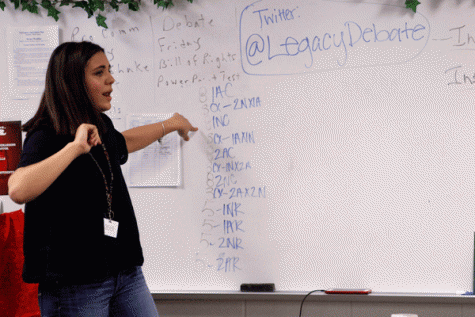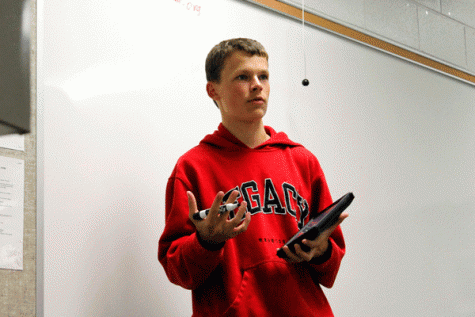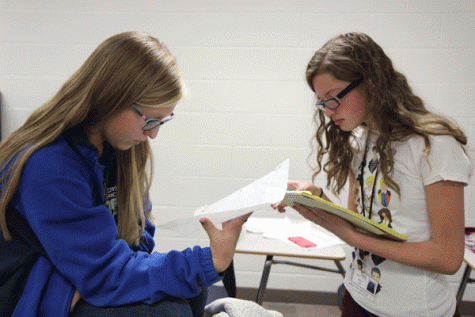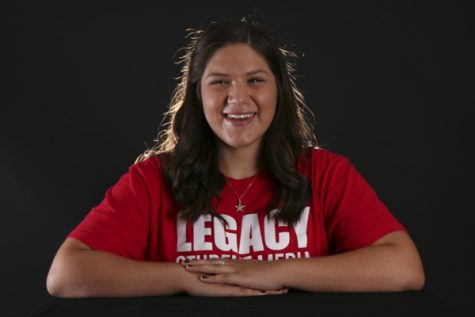Policy
With the round just beginning, junior Devyn Hinds looks to her partner in confusion about what the opposing team just asked in their time of questioning. Unable to speak, her partner remains silent while watching Hinds try her best to avoid answering the question. The worry of saying the wrong concerns Hinds, so she begins to talk about other material from her case. The timer goes off and Hinds makes her way back to her seat.

In Policy Debate, also known as CX, two partner duos argue one resolution that stands for an entire debate season. This year, the resolution states, “The United States federal government should substantially curtail its domestic surveillance.” In the rounds, each partnership has an allotted time frame to persuade the judge why their side should win. As captain of the CX debate team, junior Devyn Hinds has grown to love the difficulties that come along with the form of debate.
“I like the challenge of [CX],” Hinds said. “I like debating governmental policies more than I like debating morals. I guess it’s more challenging and harder.”
Like Hinds, sophomore Ben Schnuck finds the argumentation, thinking on the fly and finding actual evidence of debate enjoyable. Schnuck has debated for two years now and plans to continue throughout his high school career.
“Ever since I was little, I always wanted to do debate. It was nothing like I had thought it was, but just the overall presence of debate just drew me in,” Schnuck said. “I’ve always liked being in an intelligent community and discussing problems and debating.”
Lincoln-Douglas
Standing alone with no help from a partner, junior Keith Brothers faces his competitor for the first round of the day. With the opponent spreading their speech as fast as possible, Brothers was unable to keep up. The pressure of debating alone was getting to him.
Lincoln Douglas Debate often referred as LD gives students the opportunity to argue whether something is morally correct or incorrect. Unlike CX, students like Brothers must alter their arguments monthly for upcoming resolutions.

“I chose LD over CX because I like the original style of it,” Brothers said. “I can take some of LD and add a bit of CX to it to change it up a bit and make it a little more personalized to myself, unlike CX where it’s really only one style.”
Persuaded by Brothers, senior Mickale Wesson attended one team practice and has never stopped loving debate. After being in debate for a year and a half, Wesson has never been able to compete as a CX debater because past partners have not been able to show up to the tournaments.
“[My favorite part is] probably the feeling of winning and knowing that you beat your opponent using your own wits and strengths,” Wesson said.
Congress
Sophomore Kelsi Davis along with four others from Legacy walk into the first Student Congress competition. The round begins and no one knows what is going on as if they were in the wrong room. Constant glances were exchanged amongst the competitors hoping someone would know what to do.
Because this was the first year to have a Student Congress, students were forced into their first round knowing nothing but a simple foundation of the process. Every Fall and Spring, a total of 30 bills are released for teams to start constructing speeches. Like CX and LD, each round of Student Congress has two sides going head to head proving why their bill should be passed.
“I love getting to call [people] out on certain things and just kind of tell them they’re wrongs,” Davis said. “It’s really fun once you ask a good question and they [get] stumped.”

Student Congress debates real life situations such as whether or not the United States should declare war on ISIS. Although Davis does not expect to have a career in politics, she enjoys working with authentic cases to see how the process of passing bills works.
“[My favorite part is] getting to say my piece and question anyone who [goes] up,” Davis said. “It’s the fact that [it] wasn’t me against one person or I wasn’t being so direct. It’s really cool to see what we can get done as students.”
Sophomore Ryan King’s interest in politics lead him to join Student Congress. King says the more mainstream forms of debate never really interested him and has a better time working with bills.
“I’m happy to be apart of the first Student Congress team at Legacy,” King said. “[I] hope more people join it in the future.”






